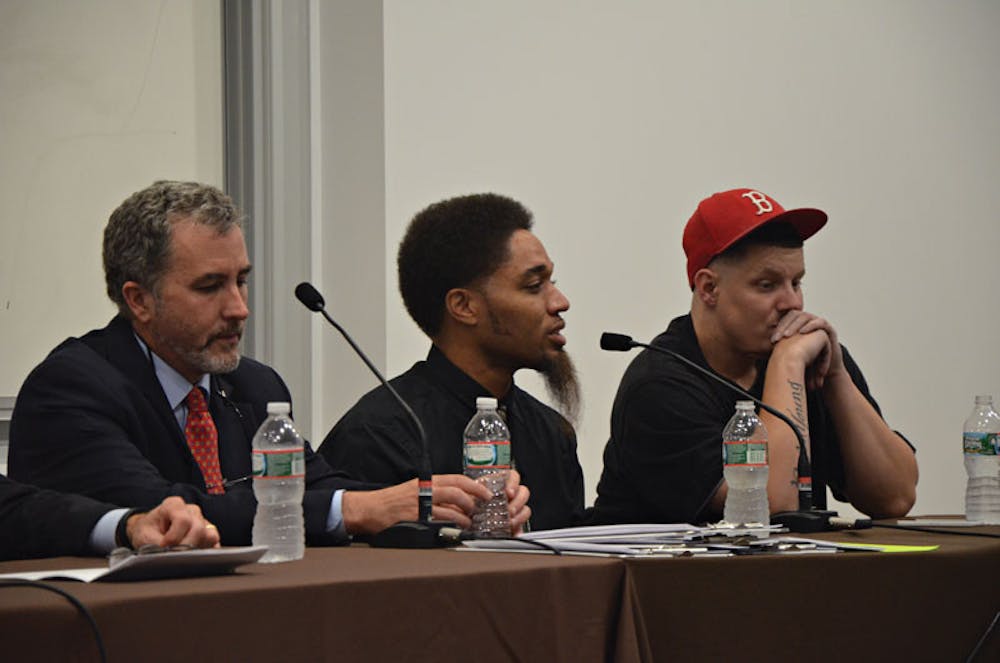During a panel event Wednesday, Moral Voices — a Brown/RISD Hillel initiative that focuses on awareness, education, advocacy and activism — invited various leaders to engage in an in-depth dialogue about gun violence in Providence and possible community-based solutions to the issue. Entering its third year since its launch, Moral Voices aims to bring greater awareness to moral issues, dedicating each year to a different issue.
For the panel, Moral Voices invited community leaders from across Providence. Three members of the Institute for the Study and Practice of Nonviolence joined the panel, including Teny Gross, the leader of the organization who is “one of the strongest voices in Providence” to discuss this issue, said Margie Thorsen ’15, chair of Moral Voices. Institute staff member Ray Duggan, a former gang member and speaker on the panel, is known for intercepting gang violence and working with the community on preventive measures, she added.
Julia Wyman, board member and legislative director of the Rhode Island Coalition Against Gun Violence, also spoke on the panel. “We wanted somebody from a more policy (or) legislative angle and discuss what the realities are of any community prevention in terms of policing,” said Brenna Scully ’17, an intern for Moral Voices.
Stephen Paré, a commissioner for the Providence Department of Public Safety who actively speaks about gun violence, was chosen to serve on the panel because of his ability to discuss his involvement with “day-to-day legal enforcement without necessarily involving politics,” Thorsen said.
While the panelists provided an array of perspectives and their discussion included both legislative and individual points, they all expressed agreement on the need for college students to become involved with raising awareness surrounding gun violence.
As an entirely volunteer-based coalition, “we really need to grow as an organization to make meaningful changes,” Wyman said, urging students to go and volunteer for the coalition. She outlined various ways student volunteers could make an impact, such as creating committees of people in the districts of Rhode Island, meeting with local representatives, challenging them on issues and testifying in hearings, adding that college students are in a unique position to do this.
“There is power in numbers,” she said. “You should use it, because it won’t last long.”
Haley De La Rosa ’17, a coordinator for Street Sights, a Brown-Rhode Island School of Design organization that works with formerly homeless individuals and publishes monthly newspapers dealing with issues of homelessness, attended the event to supplement an article for the publication about the disparity in policing gun violence in Rhode Island.
“This seemed like the perfect place to come and engage in discussions,” De La Rosa said, emphasizing the necessity of such dialogues.
Arohi Kapoor ’16, another attendee, said she especially appreciated the diverse perspectives that the panelists offered.
“We’re really hoping that they bring different lenses of the same issue, but again all within Providence and all within a very specific context,” Scully said.
“This is an issue that you could talk about for years. You can bring in anybody, so this focus (on Providence) is very important,” Thorsen added.
Since the panel focused on community-based solutions, Scully and Thorsen expressed interest in incorporating “action-oriented” community engagement into the work of the organization.
“We’re trying to mobilize people to engage with the subject outside of the educational speaker pieces that we’re offering,” Thorsen said, adding that collaboration with the Swearer Center for Public Service was particularly crucial for this project because of the center’s involvement with tangible service-oriented works.
“As we started meeting with other community leaders and other schools in the area, we realized that we really needed to talk about Swearer’s role in collaborating with these groups outside of Brown,” Scully said, adding that Moral Voices has collaborated with the Brown Center for Students of Color and the Center for the Study of Race and Ethnicity in America. The group recognized that all these organizations “have a huge stake in this conversation, and there isn’t really a way for Brown students to foster dialogues without having them involved with these groups,” Scully said.
While this semester’s events focus on structural violence and homicide, Moral Voices’ events next semester intend to focus on the intersection of mental health and gun violence. There would be a larger focus on mental health, “especially the myths and misconceptions of mental health in the context of violence,” Scully said.
The organization anticipates working with other leaders on campus, including Active Minds, Minority Peer Counselors and Residential Peer Leaders, she added.
There will be a public debriefing on the panel Thursday in J. Walter Wilson 411 from 12 to 1 p.m.

ADVERTISEMENT




